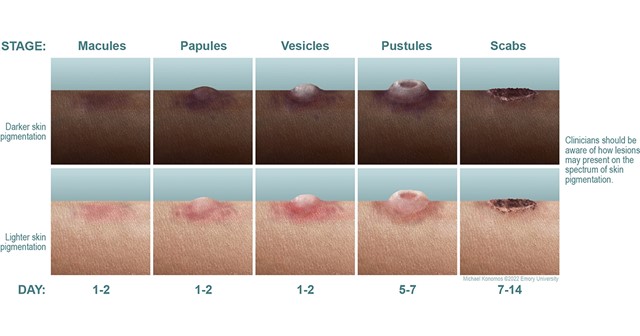Mpox Advisory
About Mpox
Mpox (formerly known as monkeypox) is a virus that can cause flu-like symptoms and a rash. Human-to-human transmission of monkeypox virus occurs by direct contact with lesions, infected body fluids, touching objects, fabrics (clothing, bedding, or towels), and surfaces that have been used by someone with monkeypox, or from exposure to respiratory secretions during prolonged face-to-face contact. Reports of human-to-human transmission include close contact with a person with mpox symptoms. A person is considered to be infectious until all scabs separate and a fresh layer of skin is formed.

Testing

Testing for people with mpox symptoms is available at SHWC and our providers can promptly diagnose and manage suspected and confirmed cases as well as provide guidance for exposed contacts. Schedule a same-day appointment through the Patient Portal or by calling (404) 756-1241.
Prevention and Risk Reduction
Individuals can minimize their risk for exposure by:
- Asking sexual partners whether they have a rash or other symptoms of mpox.
- Avoiding skin-to-skin contact with someone who has a rash or other mpox symptoms and those diagnosed with mpox.
- Not sharing bedding, towels, clothing, utensils, or cups with a person with mpox.
- Wash your hands often with soap and water or use an alcohol-based hand sanitizer.
Students should reach out to the SHWC if exposed or experiencing symptoms.
Students should complete the AUCC SHWC Infectious Disease Reporting Form if they test positive for mpox.
If you would like to speak with someone to discuss your concerns around exposure risks and prevention strategies, please call the Georgia Department of Public Health at 866-PUB-HLTH (866-782-4584) or SHWC at (404) 756-1241 to speak with a medical provider.
Vaccination
The Mpox vaccine is available at the SHWC. Vaccination may be recommended for people who are close personal contacts of people with mpox virus, individuals who may have been exposed to mpox, or people who have increased risk of being exposed to the virus.
Learn more about Mpox:

